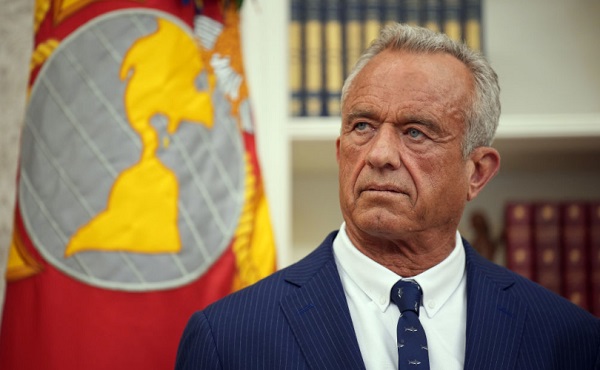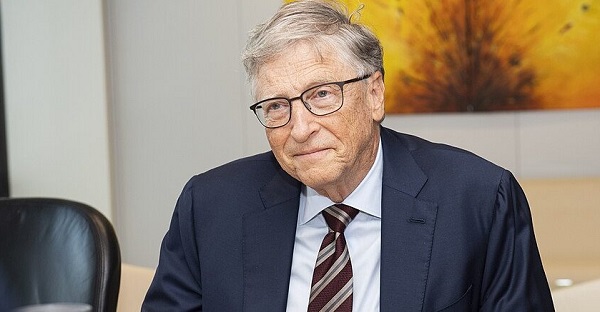Health
RFK Jr. promises to identify cause of autism ‘epidemic’ by September

From LifeSiteNews
Robert F. Kennedy Jr. explained that autism rates continue to climb, and are now expected to impact 1 in 31 children, up from ‘1 in 10,000 when I was a kid.’
Health and Human Services (HHS) Secretary Robert F. Kennedy Jr. said that his agency has undertaken a multinational study involving “hundreds of scientists around the world” to identify the causes of the growing incidence of autism in children.
“We’ve launched a massive testing and research effort that’s going to involve hundreds of scientists from around the world,” Kennedy told President Trump during Thursday’s White House Cabinet meeting. “By September, we will know what has caused the autism epidemic, and we’ll be able to eliminate those exposures.”
Kennedy explained that autism rates continue to climb, and are now expected to impact 1 in 31 children, up from “1 in 10,000 when I was a kid.”
“It’s a horrible statistic,” Trump said of the latest autism rate figures. “There’s got to be something artificial out there that’s doing this.”
“There will be no bigger news conference than when you come up with that answer,” predicted the president.
As recently as 2000, Centers for Disease Control and Prevention (CDC) research showed that 1 in 150 children were diagnosed with autism.
While many mainstream autism researchers adhere to theories that the rising rate of autism is due to “increased awareness” and an evolving, broadening definition of autism, Kennedy holds to that belief that the cause will be found primarily in environmental factors, eating habits, and currently accepted standard medical protocols.
“We’re going to look at vaccines, but we’re going to look at everything. Everything is on the table, our food system, our water, our air, different ways of parenting, all the kind of changes that may have triggered this epidemic,” the HHS head told Fox News.
“It is an epidemic,” Kennedy insisted. “Epidemics are not caused by genes. Genes can provide a vulnerability, but you need an environmental toxin.”
“We know that it is an environmental toxin that is causing this cataclysm,” said Kennedy, “and we are going to identify it.”
Kennedy is known for vehemently opposing vaccines, a stance he adopted after the mothers of vaccine-injured children implored him to look into the research linking thimerosal to neurological injuries, including autism. He went on to found Children’s Health Defense, an organization with the stated mission of “ending childhood health epidemics by eliminating toxic exposure,” largely through vaccines.
The federal government spent more than $300 million on autism research in 2023, according to a report by The Hill.
Health
RFK Jr. urges global health authorities to remove mercury from all vaccines

From LifeSiteNews
Health and Human Services (HHS) Secretary Robert F. Kennedy Jr. is urging health leaders across the planet to stop including mercury in vaccinations.
“Now that America has removed mercury from all vaccines, I call on every global health authority to do the same — to ensure that no child, anywhere in the world, is ever exposed to this deadly neurotoxin again,” he said.
Kennedy’s comments came in a video he recorded for the Minamata Convention on Mercury. The event is an international gathering aimed at preventing human contact with mercury, which, according to the World Health Organization (WHO), is one of the top 10 chemicals of major public health concern. The treaty, backed by the United Nations (UN), was first signed in 2013 by over 140 countries.
Kennedy noted that while the group’s goal is no doubt praiseworthy, it has not gone far enough in its efforts.
“Article 4 of the convention calls on parties to cut mercury use by phasing out listed, mercury-added products. But in 2010, as the treaty took shape, negotiators made a major exception. Thimerosal-containing vaccines were carved out of the regulation,” he recalled.
“The same treaty that began to phase out mercury in lamps and cosmetics chose to leave it in products injected into babies, pregnant women, and the most vulnerable among us,” he noted. “We have to ask: Why? Why do we hold a double standard for mercury? Why call it dangerous in batteries, in over-the-counter medications, and make-up but acceptable in vaccines and dental fillings?”
This past summer, Kennedy’s Advisory Committee for Immunization Practices launched a study to research the vaccine schedule for children. Among other recommendations, the committee advised the removal of thimerosal, a neurotoxic, mercury-containing preservative that had been used in flu shots.
Kennedy noted in his video message that “thimerosal’s own label requires it to be treated as a hazardous material and warns against ingestion,” adding that “there is not a single study that proves it’s safe. That’s why in July of this year the United States closed the final chapter on the use of thimerosal as a vaccine preservative, something that should have happened years ago.”
Kennedy further explained that thimerosal is “a potent neurotoxin, a mutagen, a carcinogen, and an endocrine disrupter” while noting that “safe alternatives” already exist.
“Manufacturers have confirmed that they can produce mercury-free, single dose vaccines without interrupting supply. There is no excuse for inaction or holding stubbornly to the status quo,” he exclaimed. “Now that America has removed mercury from all vaccines, I call on every global health authority and every party to this convention to do the same.”
“Let’s honor and protect humanity, and our children, and creation from mercury,” he concluded.
The Minamata Convention on Mercury went into effect in August 2017. It was initially approved by the Intergovernmental Negotiating Committee in Geneva, Switzerland, in January 2013. It was adopted in October 2013 at a Diplomatic Conference in Kumamoto, Japan. Per its website, it is named “after the bay in Japan where, in the mid-20th century, mercury-tainted industrial wastewater poisoned thousands of people, leading to severe health damage that became known as the ‘Minamata disease.’”
Business
Bill Gates Gets Mugged By Reality


From the Daily Caller News Foundation
You’ve probably heard by now the blockbuster news that Microsoft founder Bill Gates, one of the richest people to ever walk the planet, has had a change of heart on climate change.
For several decades Gates poured billions of dollars into the climate industrial complex.
Some conservatives have sniffed that Bill Gates has shifted his position on climate change because he and Microsoft have invested heavily in energy intensive data centers.
AI and robotics will triple our electric power needs over the next 15 years. And you can’t get that from windmills.
What Bill Gates has done is courageous and praiseworthy. It’s not many people of his stature that will admit that they were wrong. Al Gore certainly hasn’t. My wife says I never do.
Although I’ve only once met Bill Gates, I’ve read his latest statements on global warming. He still endorses the need for communal action (which won’t work), but he has sensibly disassociated himself from the increasingly radical and economically destructive dictates from the green movement. For that, the left has tossed him out of their tent as a “traitor.”
I wish to highlight several critical insights that should be the starting point for constructive debate that every clear-minded thinker on either side of the issue should embrace.
(1) It’s time to put human welfare at the center of our climate policies. This includes improving agriculture and health in poor countries.
(2) Countries should be encouraged to grow their economies even if that means a reliance on fossil fuels like natural gas. Economic growth is essential to human progress.
(3) Although climate change will hurt poor people, for the vast majority of them it will not be the only or even the biggest threat to their lives and welfare. The biggest problems are poverty and disease.
I would add to these wise declarations two inconvenient truths: First: the solution to changing temperatures and weather patterns is technological progress. A far fewer percentage of people die of severe weather events today than 50 or 100 or 1,000 years ago.
Second, energy is the master resource and to deny people reliable and affordable energy is to keep them poor and vulnerable – and this is inhumane.
If Bill Gates were to start directing even a small fraction of his foundation funds to ensuring everyone on the planet has access to electric power and safe drinking water, it would do more for humanity than all of the hundreds of billions that governments and foundations have devoted to climate programs that have failed to change the globe’s temperature.
Stephen Moore is a co-founder of Unleash Prosperity and a former Trump senior economic advisor.
-

 Business2 days ago
Business2 days agoCarney budget continues misguided ‘Build Canada Homes’ approach
-

 Business2 days ago
Business2 days agoCarney budget doubles down on Trudeau-era policies
-

 Business1 day ago
Business1 day agoBill Gates Gets Mugged By Reality
-

 armed forces1 day ago
armed forces1 day agoIt’s time for Canada to remember, the heroes of Kapyong
-

 COVID-192 days ago
COVID-192 days agoCrown still working to put Lich and Barber in jail
-

 Alberta1 day ago
Alberta1 day agoAlberta’s number of inactive wells trending downward
-

 Censorship Industrial Complex1 day ago
Censorship Industrial Complex1 day agoSchool Cannot Force Students To Use Preferred Pronouns, US Federal Court Rules
-

 Alberta1 day ago
Alberta1 day agoAlberta Announces Members of Class Size and Complexity Committee









